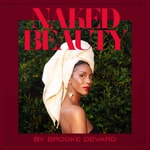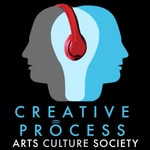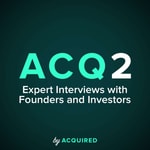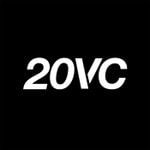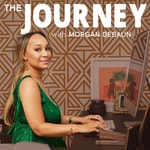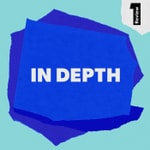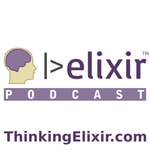Education, The Creative Process: Educators, Writers, Artists, Activists Talk Teachers, Schools & Creativity – Details, episodes & analysis
Podcast details
Technical and general information from the podcast's RSS feed.
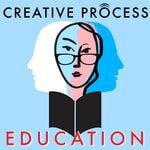
Education, The Creative Process: Educators, Writers, Artists, Activists Talk Teachers, Schools & Creativity
Educators, Writers, Artists, Activists Talk Teaching & Learning: Creative Process Original Series
Frequency: 1 episode/2d. Total Eps: 300

Education episodes of the popular The Creative Process podcast. We speak to educators, writers, artists, activists, teachers, librarians in the arts, STEM & other disciplines. To listen to ALL arts & education episodes of “The Creative Process · Arts, Culture & Society”, you’ll find our main podcast on Apple: tinyurl.com/thecreativepod, Spotify: tinyurl.com/thecreativespotify, or wherever you get your podcasts!
Exploring the fascinating minds of creative people. Conversations with writers, artists & creative thinkers across the Arts & STEM. We discuss their life, work & artistic practice. Winners of Oscar, Emmy, Tony, Pulitzer, leaders & public figures share real experiences & offer valuable insights. Notable guests and participating museums and organizations include: Academy of Motion Picture Arts & Sciences, Neil Patrick Harris, Smithsonian, Roxane Gay, Musée Picasso, EARTHDAY.ORG, Neil Gaiman, UNESCO, Joyce Carol Oates, Mark Seliger, Acropolis Museum, Hilary Mantel, Songwriters Hall of Fame, George Saunders, The New Museum, Lemony Snicket, Pritzker Architecture Prize, Hans-Ulrich Obrist, Serpentine Galleries, Joe Mantegna, PETA, Greenpeace, EPA, Morgan Library & Museum, and many others.
The interviews are hosted by founder and creative educator Mia Funk with the participation of students, universities, and collaborators from around the world. These conversations are also part of our traveling exhibition. www.creativeprocess.info
For The Creative Process podcasts from Seasons 1 & 2, visit: tinyurl.com/creativepod or creativeprocess.info/interviews-page-1, which has our complete directory of interviews, transcripts, artworks, and details about ways to get involved.
INSTAGRAM @creativeprocesspodcast
Recent rankings
Latest chart positions across Apple Podcasts and Spotify rankings.
Apple Podcasts
🇬🇧 Great Britain - howTo
19/06/2025#82🇬🇧 Great Britain - howTo
18/06/2025#45🇩🇪 Germany - howTo
09/06/2025#76🇩🇪 Germany - howTo
08/06/2025#48🇬🇧 Great Britain - howTo
03/05/2025#72🇬🇧 Great Britain - howTo
02/05/2025#39🇫🇷 France - howTo
19/04/2025#89🇫🇷 France - howTo
18/04/2025#68🇫🇷 France - howTo
16/02/2025#76🇫🇷 France - howTo
06/01/2025#76
Spotify
No recent rankings available
Shared links between episodes and podcasts
Links found in episode descriptions and other podcasts that share them.
See all- http://www.creativeprocess.info
4801 shares
- http://www.oneplanetpodcast.org
4152 shares
- https://studiorichtermahr.com
247 shares
- https://twitter.com/palumboliu?s=20
270 shares
- https://twitter.com/mroth78
44 shares
- https://twitter.com/dfenton?lang=en
22 shares
RSS feed quality and score
Technical evaluation of the podcast's RSS feed quality and structure.
See allScore global : 63%
Publication history
Monthly episode publishing history over the past years.
How can journalism make people care about crises & create solutions? - Highlights - NICHOLAS KRISTOF
Season 13
lundi 26 août 2024 • Duration 16:26
“If you look over the last 500 years or so, the best metric to predict where society will be in 30 or 50 years, the best metric is simply education today. One reason I think the U.S. is the world's largest and most successful economy today is that, beginning in the 19th century and through about 1970, the U.S. led the world in mass education. And what matters is not so much elite education. Britain had Eton, Oxford, and Cambridge, and it had better elite education, but it wasn't great at mass education. And the U.S. really was. We were the first country to have almost universal literacy, male and female. We were the first country to have widespread high school attendance and the first country to have significant college attendance. And then, beginning in about the 1970s, we lost that lead. And now, there are many countries that are way ahead of us. I think back to my old classmates who are now dead, and I think: What were adults thinking in the 1970s that they let them drop out? And yet, I think today: What are adults thinking in 2024 when they let one in seven American kids today drop out of high school and let so many emerge from the school system not literate, not numerate, completely unprepared for the 21st century?”
Nicholas D. Kristof is a two-time Pulitzer-winning journalist and Op-ed columnist for The New York Times, where he was previously bureau chief in Hong Kong, Beijing, and Tokyo. Kristof is a regular CNN contributor and has covered, among many other events and crises, the Tiananmen Square protests, the Darfur genocide, the Yemeni civil war, and the U.S. opioid crisis. He is the author of the memoir Chasing Hope, A Reporter's Life, and coauthor, with his wife, Sheryl WuDunn, of five previous books: Tightrope, A Path Appears, Half the Sky, Thunder from the East, and China Wakes.
Family vineyard & apple orchard in Yamhill, Oregon: www.kristoffarms.com
www.creativeprocess.info
www.oneplanetpodcast.org
IG www.instagram.com/creativeprocesspodcast
Chasing Hope: A Reporter's Life w/ Pulitzer Prize-winning Journalist NICHOLAS KRISTOF
Season 13
lundi 26 août 2024 • Duration 43:47
How can journalism make people care and bring about solutions? What role does storytelling play in shining a light on injustice and crises and creating a catalyst for change?
Nicholas D. Kristof is a two-time Pulitzer-winning journalist and Op-ed columnist for The New York Times, where he was previously bureau chief in Hong Kong, Beijing, and Tokyo. Kristof is a regular CNN contributor and has covered, among many other events and crises, the Tiananmen Square protests, the Darfur genocide, the Yemeni civil war, and the U.S. opioid crisis. He is the author of the memoir Chasing Hope, A Reporter's Life, and coauthor, with his wife, Sheryl WuDunn, of five previous books: Tightrope, A Path Appears, Half the Sky, Thunder from the East, and China Wakes.
“If you look over the last 500 years or so, the best metric to predict where society will be in 30 or 50 years, the best metric is simply education today. One reason I think the U.S. is the world's largest and most successful economy today is that, beginning in the 19th century and through about 1970, the U.S. led the world in mass education. And what matters is not so much elite education. Britain had Eton, Oxford, and Cambridge, and it had better elite education, but it wasn't great at mass education. And the U.S. really was. We were the first country to have almost universal literacy, male and female. We were the first country to have widespread high school attendance and the first country to have significant college attendance. And then, beginning in about the 1970s, we lost that lead. And now, there are many countries that are way ahead of us. I think back to my old classmates who are now dead, and I think: What were adults thinking in the 1970s that they let them drop out? And yet, I think today: What are adults thinking in 2024 when they let one in seven American kids today drop out of high school and let so many emerge from the school system not literate, not numerate, completely unprepared for the 21st century?”
Family vineyard & apple orchard in Yamhill, Oregon: www.kristoffarms.com
www.creativeprocess.info
www.oneplanetpodcast.org
IG www.instagram.com/creativeprocesspodcast
Photo credit: David Hume Kennerly
Utopia in the Age of Survival with S. D. CHROSTOWSKA
Season 13
mercredi 24 juillet 2024 • Duration 44:50
As Surrealism turns 100, what can it teach us about the importance of dreaming and creating a better society? Will we wake up from the consumerist dream sold to us by capitalism and how would that change our ideas of utopia?
S. D. Chrostowska is professor of humanities at York University, Canada. She is the author of several books, among them Permission, The Eyelid, A Cage for Every Child, and, most recently, Utopia in the Age of Survival: Between Myth and Politics. Her essays have appeared in such venues as Public Culture, Telos, Boundary 2, and The Hedgehog Review. She also coedits the French surrealist review Alcheringa and is curator of the 19th International Exhibition of Surrealism, Marvellous Utopia, which runs from July to September 2024 in Saint-Cirq-Lapopie, France.
“I'd like young people not to limit their world to content they can find on the internet. I think that's a real danger. Many of my students say, “well, I haven't thought about this,” “I haven't read this because I didn't find it online for free.” I want them to remember that not all knowledge is digitized, that much remains elusive to the nets of the internet even in its effort to make knowledge accessible on one platform, to create this kind of enormous encyclopedia. And in this quest, we also reduce the past to the present. The past is more virtually present in our lives than for any other generation, because it's available online in the form of textual and audiovisual archives. This proximity actually affects the past's pastness. The appearance of distance is lost in the digital reproduction, whether it's paintings, or archival documents, or photographs. I think it's erroneous to think that everything that is extant from the past is at our fingertips and that we don't have to go out and look for it. So what I would like to pass on is curiosity; curiosity about the past shouldn't stop at the digital. It's tempting to think that all the answers are already there online because it's so vast, this web we are spinning, but that’s not the case.”
https://profiles.laps.yorku.ca/profiles/sylwiac/
www.sup.org/books/title/?id=33445
https://chbooks.com/Books/T/The-Eyelid
https://ciscm.fr/en/merveilleuse-utopie
www.creativeprocess.info
www.oneplanetpodcast.org
IG www.instagram.com/creativeprocesspodcast
Climate Change, Mental Health & Fighting for a Better Future - Highlights - CHARLIE HERTZOG YOUNG
Season 13
vendredi 19 juillet 2024 • Duration 17:28
“There's a whole section in my book about tips and advice. One of the ways that I try to maintain a feeling of safety while also not collapsing into a state of passivity, and it's taken a very long time for me to learn this, but it’s being forgiving with myself. One of the people who I write about a lot in the book is Jennifer Uchandu, a Nigerian climate activist and mental health activist who sets up an organization called The Eco-Anxiety in Africa Project. She talks about needing to remind herself constantly. Her test is not whether she's doing enough, it's whether she's doing her best. And doing her best doesn't mean doing as much as she possibly can, it means having the right balance of self care and action. Recently I've been really struggling with insomnia because I've still got quite bad nerve pain from my surgeries. And it sounds so simple and I used to get annoyed at these things, but just breathing. You know, deep breathing and kind of breathing into my back. Spending time in nature is also helpful. It can be quite hard for me because my mobility isn't always great on my prosthetics or if I'm in a wheelchair, but I swim a lot. And I draw a lot. One of the things that's been really amazing is that over the last few years, me and my friends have gotten into the habit of calling one another as first points of contact, not just in crisis, but if we've had a tricky day.”
Charlie Hertzog Young is a researcher, writer and award-winning activist. He identifies as a “proudly mad bipolar double amputee” and has worked for the New Economics Foundation, the Royal Society of Arts, the Good Law Project, the Four Day Week Campaign and the Centre for Progressive Change, as well as the UK Labour Party under three consecutive leaders. Charlie has spoken at the LSE, the UN and the World Economic Forum. He studied at Harvard, SOAS and Schumacher College and has written for The Ecologist, The Independent, Novara Media, Open Democracy and The Guardian. He is the author of Spinning Out: Climate Change, Mental Health and Fighting for a Better Future.
https://charliehertzogyoung.me
https://footnotepress.com/books/spinning-out/
www.creativeprocess.info
www.oneplanetpodcast.org
IG www.instagram.com/creativeprocesspodcast
The Mind, Climate Change & Community Resilience with CHARLIE HERTZOG YOUNG
Season 13
vendredi 19 juillet 2024 • Duration 58:38
The planet’s well-being unites us all, from ecosystems to societies, global systems to individual health. How is planetary health linked to mental health?
Charlie Hertzog Young is a researcher, writer and award-winning activist. He identifies as a “proudly mad bipolar double amputee” and has worked for the New Economics Foundation, the Royal Society of Arts, the Good Law Project, the Four Day Week Campaign and the Centre for Progressive Change, as well as the UK Labour Party under three consecutive leaders. Charlie has spoken at the LSE, the UN and the World Economic Forum. He studied at Harvard, SOAS and Schumacher College and has written for The Ecologist, The Independent, Novara Media, Open Democracy and The Guardian. He is the author of Spinning Out: Climate Change, Mental Health and Fighting for a Better Future.
“There's a whole section in my book about tips and advice. One of the ways that I try to maintain a feeling of safety while also not collapsing into a state of passivity, and it's taken a very long time for me to learn this, but it’s being forgiving with myself. One of the people who I write about a lot in the book is Jennifer Uchandu, a Nigerian climate activist and mental health activist who sets up an organization called The Eco-Anxiety in Africa Project. She talks about needing to remind herself constantly. Her test is not whether she's doing enough, it's whether she's doing her best. And doing her best doesn't mean doing as much as she possibly can, it means having the right balance of self care and action. Recently I've been really struggling with insomnia because I've still got quite bad nerve pain from my surgeries. And it sounds so simple and I used to get annoyed at these things, but just breathing. You know, deep breathing and kind of breathing into my back. Spending time in nature is also helpful. It can be quite hard for me because my mobility isn't always great on my prosthetics or if I'm in a wheelchair, but I swim a lot. And I draw a lot. One of the things that's been really amazing is that over the last few years, me and my friends have gotten into the habit of calling one another as first points of contact, not just in crisis, but if we've had a tricky day.”
https://charliehertzogyoung.me
https://footnotepress.com/books/spinning-out/
www.creativeprocess.info
www.oneplanetpodcast.org
IG www.instagram.com/creativeprocesspodcast
How and when will we transition to a clean energy future? - Highlights - RICHARD BLACK
Season 13
mardi 16 juillet 2024 • Duration 13:02
The Five-pronged Clean Energy Future
“I thought about it, and I was wondering, what do we actually need in the world? Because we don't need petrol and we don't need coal. We need energy to power various things. So, we need these energy services. So, what's the simplest way of providing all of the energy services? And it really seems to me that we can basically do it all with about five different types of goods. So the system of the future I put out in the book is first of all, you have the generation of electricity, which is mainly going to be with renewables, mainly with wind and solar because they are the cheapest and they're getting cheaper thanks to Wright's Law. Then you need energy storage and other means of sharing matching demand to supply. So, storage is the one that people will be most familiar with, which can be batteries, for example. And again, the price of batteries has also plummeted about 85 percent price reduction in a decade. And it continues because, again, we have mounting volumes. In a competitive market, there's lots of innovation going on in terms of battery design, in terms of construction, and all of this stuff, new materials coming into batteries. So, that's your first two, that's your renewable generation and your battery storage. Electric vehicles will be the main method of transportation. Already, they dominate sales in the two-wheeler market in China and India. They're already eating into global oil demand. They're taking about 1.5 percent of global oil demand already, and the sales are increasing exponentially in China and other countries as well. They are cost-competitive. It's just on the purchase price in some markets with some models now. And it's going to get cheaper again because battery costs will fall. Heating and cooling, which is a big demand for energy. We can use heat pumps, which are super efficient running on electricity…Hydrogen, that will probably be the fifth prong, but a smaller prong, rather like the little finger on your hand.”
Richard Black spent 15 years as a science and environment correspondent for the BBC World Service and BBC News, before setting up the Energy & Climate Intelligence Unit. He now lives in Berlin and is the Director of Policy and Strategy at the global clean energy think tank Ember, which aims to accelerate the clean energy transition with data and policy. He is the author of The Future of Energy; Denied:The Rise and Fall of Climate Contrarianism, and is an Honorary Research Fellow at Imperial College London.
https://mhpbooks.com/books/the-future-of-energy
https://ember-climate.org/about/people/richard-black
https://ember-climate.org
www.therealpress.co.uk/?s=Richard+black
www.creativeprocess.info
www.oneplanetpodcast.org
IG www.instagram.com/creativeprocesspodcast
The Future of Energy - RICHARD BLACK - Director, Policy & Strategy, Ember - Fmr. BBC Environment Correspondent
Season 13
samedi 13 juillet 2024 • Duration 56:02
How and when will we transition to a clean energy future? How will the transition empower individuals and transform global power dynamics? How did China become the world’s first electrostate, leading the drive for renewable energy, and what can we learn from this?
Richard Black spent 15 years as a science and environment correspondent for the BBC World Service and BBC News, before setting up the Energy & Climate Intelligence Unit. He now lives in Berlin and is the Director of Policy and Strategy at the global clean energy think tank Ember, which aims to accelerate the clean energy transition with data and policy.
He is the author of The Future of Energy; Denied:The Rise and Fall of Climate Contrarianism, and is an Honorary Research Fellow at Imperial College London.
The Five-pronged Clean Energy Future
“I thought about it, and I was wondering, what do we actually need in the world? Because we don't need petrol and we don't need coal. We need energy to power various things. So, we need these energy services. So, what's the simplest way of providing all of the energy services? And it really seems to me that we can basically do it all with about five different types of goods. So the system of the future I put out in the book is first of all, you have the generation of electricity, which is mainly going to be with renewables, mainly with wind and solar because they are the cheapest and they're getting cheaper thanks to Wright's Law. Then you need energy storage and other means of sharing matching demand to supply. So, storage is the one that people will be most familiar with, which can be batteries, for example. And again, the price of batteries has also plummeted about 85 percent price reduction in a decade. And it continues because, again, we have mounting volumes. In a competitive market, there's lots of innovation going on in terms of battery design, in terms of construction, and all of this stuff, new materials coming into batteries. So, that's your first two, that's your renewable generation and your battery storage. Electric vehicles will be the main method of transportation. Already, they dominate sales in the two-wheeler market in China and India. They're already eating into global oil demand. They're taking about 1.5 percent of global oil demand already, and the sales are increasing exponentially in China and other countries as well. They are cost-competitive. It's just on the purchase price in some markets with some models now. And it's going to get cheaper again because battery costs will fall. Heating and cooling, which is a big demand for energy. We can use heat pumps, which are super efficient running on electricity…Hydrogen, that will probably be the fifth prong, but a smaller prong, rather like the little finger on your hand.”
https://mhpbooks.com/books/the-future-of-energy
https://ember-climate.org/about/people/richard-black
https://ember-climate.org
www.therealpress.co.uk/?s=Richard+black
www.creativeprocess.info
www.oneplanetpodcast.org
IG www.instagram.com/creativeprocesspodcast
Making Impactful Films with Oscar & Emmy-winning Director SHARMEEN OBAID-CHINOY - Highlights
Season 13
vendredi 5 juillet 2024 • Duration 10:29
“As a filmmaker, I've always made films about extraordinary women whose lives are faced with extenuating circumstances who've had adversity thrown at them and who've risen to the occasion. And when I began to look at Diane's story, for me, Diane is a fashion designer, but she's so much more. Her central ethos is woman before fashion, and we felt it was very important to take that ethos and weave it into the spine of our film, and make it about the woman.
In making this film, every single person who we called whose voice we wanted to include wanted to contribute. They wanted to say something about Diane, because she had left such a mark on their lives. Our producers’ jobs, Tracy and Fabiola, was to juggle those schedules. How do you juggle the schedule of secretary Hillary Clinton with Oprah Winfrey? How do you make sure that Anderson Cooper and Mark Jacobs, you know, in the filming time that we had, that we could put all of these people together? But Diane's friendships run deep with people, and people made sure to make time.
You know, she was a single mother, and I think that young single mothers watching this film will feel for Diane, especially single mothers who are trying to be entrepreneurs, and creating businesses, and trying to find their way into the world to be able to raise a family. To do that as an immigrant in a new country is challenging, and Diane shows you just how challenging it is. In making choices about living her life, in being with her children or expanding her business, there were sacrifices that were made, and those sacrifices are boldly put on the screen for viewers to watch.”
Sharmeen Obaid-Chinoy is an Oscar and Emmy award-winning Canadian-Pakistani filmmaker whose work highlights extraordinary women and their stories. She earned her first Academy Award in 2012 for her documentary Saving Face, about the Pakistani women targeted by brutal acid attacks. Today, Obaid-Chinoy is the first female film director to have won two Oscars by the age of 37. In 2023, it was announced that Obaid-Chinoy will direct the next Star Wars film starring Daisy Ridley. Her most recent project, co-directed alongside Trish Dalton, is the new documentary Diane von Fürstenberg: Woman in Charge, about the trailblazing Belgian fashion designer who invented the wrap dress 50 years ago. The film had its world premiere as the opening night selection at the 2024 Tribeca Festival on June 5th and premiered on June 25th on Hulu in the U.S. and Disney+ internationally. A product of Obaid-Chinoy's incredibly talented female filmmaking team, Woman in Charge provides an intimate look into Diane von Fürstenberg’s life and accomplishments and chronicles the trajectory of her signature dress from an innovative fashion statement to a powerful symbol of feminism.
www.hulu.com/movie/diane-von-furstenberg-woman-in-charge-95fb421e-b7b1-4bfc-9bbf-ea666dba0b02
https://www.disneyplus.com/movies/diane-von-furstenberg-woman-in-charge/1jrpX9AhsaJ6
https://socfilms.com
www.creativeprocess.info
www.oneplanetpodcast.org
IG www.instagram.com/creativeprocesspodcast
DIANE VON FURSTENBERG: Woman in Charge w/ Oscar-winning Director SHARMEEN OBAID-CHINOY
Season 13
jeudi 4 juillet 2024 • Duration 37:47
How can we free ourselves from fear and social barriers to live more fulfilling and meaningful lives? What does it take to overcome trauma and turn it into triumph, and failure into reinvention? How can we shine a light on the marginalized and misunderstood to create social change that transforms the lives of women?
Sharmeen Obaid-Chinoy is an Oscar and Emmy award-winning Canadian-Pakistani filmmaker whose work highlights extraordinary women and their stories. She earned her first Academy Award in 2012 for her documentary Saving Face, about the Pakistani women targeted by brutal acid attacks. Today, Obaid-Chinoy is the first female film director to have won two Oscars by the age of 37. In 2023, it was announced that Obaid-Chinoy will direct the next Star Wars film starring Daisy Ridley. Her most recent project, co-directed alongside Trish Dalton, is the new documentary Diane von Fürstenberg: Woman in Charge, about the trailblazing Belgian fashion designer who invented the wrap dress 50 years ago. The film had its world premiere as the opening night selection at the 2024 Tribeca Festival on June 5th and premiered on June 25th on Hulu in the U.S. and Disney+ internationally. A product of Obaid-Chinoy's incredibly talented female filmmaking team, Woman in Charge provides an intimate look into Diane von Fürstenberg’s life and accomplishments and chronicles the trajectory of her signature dress from an innovative fashion statement to a powerful symbol of feminism.
“As a filmmaker, I've always made films about extraordinary women whose lives are faced with extenuating circumstances who've had adversity thrown at them and who've risen to the occasion. And when I began to look at Diane's story, for me, Diane is a fashion designer, but she's so much more. Her central ethos is woman before fashion, and we felt it was very important to take that ethos and weave it into the spine of our film, and make it about the woman.
In making this film, every single person who we called whose voice we wanted to include wanted to contribute. They wanted to say something about Diane, because she had left such a mark on their lives. Our producers’ jobs, Tracy and Fabiola, was to juggle those schedules. How do you juggle the schedule of secretary Hillary Clinton with Oprah Winfrey? How do you make sure that Anderson Cooper and Mark Jacobs, you know, in the filming time that we had, that we could put all of these people together? But Diane's friendships run deep with people, and people made sure to make time.
You know, she was a single mother, and I think that young single mothers watching this film will feel for Diane, especially single mothers who are trying to be entrepreneurs, and creating businesses, and trying to find their way into the world to be able to raise a family. To do that as an immigrant in a new country is challenging, and Diane shows you just how challenging it is. In making choices about living her life, in being with her children or expanding her business, there were sacrifices that were made, and those sacrifices are boldly put on the screen for viewers to watch.”
www.hulu.com/movie/diane-von-furstenberg-woman-in-charge-95fb421e-b7b1-4bfc-9bbf-ea666dba0b02
https://www.disneyplus.com/movies/diane-von-furstenberg-woman-in-charge/1jrpX9AhsaJ6
https://socfilms.com
www.creativeprocess.info
www.oneplanetpodcast.org
IG www.instagram.com/creativeprocesspodcast
How can music disrupt oppression & bring about social change? - Highlights - JAKE FERGUSON, ANTHONY JOSEPH & JERMAIN JACKMAN
Season 13
mardi 2 juillet 2024 • Duration 14:58
“I think as humans, we forget. We are often limited by our own stereotypes, and we don't see that in everyone there's the potential for beauty and love and all these things. And I think The Architecture of Oppression, both parts one and two, are really a reflection of all the community and civil rights work that I've been doing for the same amount of time, really - 25 years. And I wanted to try and mix my day job and my music side, so bringing those two sides of my life together. I wanted to create a platform for black artists, black singers, and poets who I really admire. Jermain is somebody I've worked with for probably about six, seven years now. He's also in the trenches of the black civil rights struggle. We worked together on a number of projects, but it was very interesting to then work with Jemain in a purely artistic capacity. And it was a no-brainer to give Anthony a call for this second album because I know of his pedigree, and he's much more able to put ideas and thoughts on paper than I would be able to.”
Jake Ferguson is an award-winning musician known for his work with The Heliocentrics and as a solo artist under the name The Brkn Record. Alongside legendary drummer Malcolm Catto, Ferguson has composed two film scores and over 10 albums, collaborating with icons like Archie Shepp, Mulatu Astatke, and Melvin Van Peebles. His latest album is The Architecture of Oppression Part 2. The album also features singer and political activist Jermain Jackman, a former winner of The Voice (2014) and the T.S. Eliot Prize winning poet and musician, Anthony Joseph.
www.creativeprocess.info
www.oneplanetpodcast.org
IG www.instagram.com/creativeprocesspodcast

